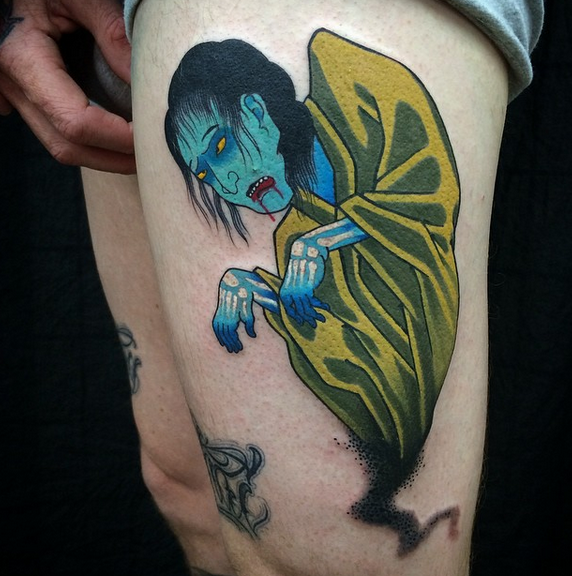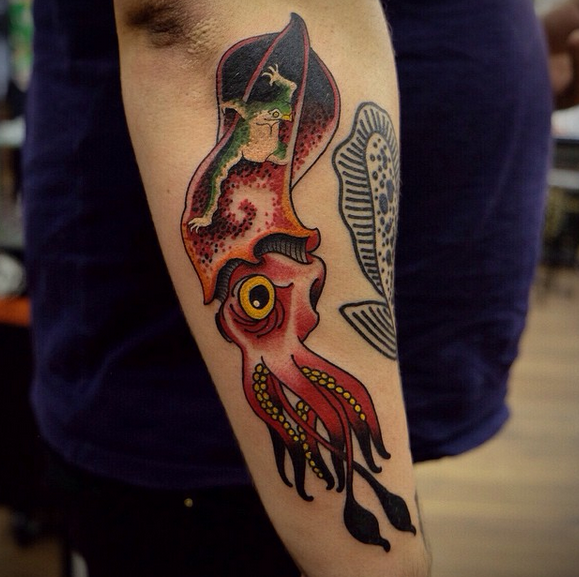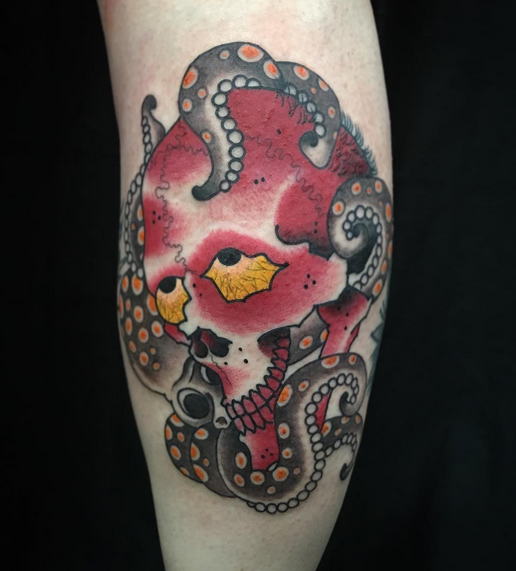‘Shaded’ is an on-going interview series created by 22-year-old Bournemouth-hailing music journalism student, writer and editor James Musker, which focuses on tattooists, the interesting people that wear their work and both the artist and canvas’s relationship to the craft.
Danny Rossiter is a legendary 37-year-old tattoo artist and co-owner of Manchester’s Rain City Tattoo Collective. As part of Things and Ink’s ongoing interview series ‘Shaded’, I spoke with ‘The King’ about his passion for tribal tattooing, surfing and Japanese culture as he tattooed my shoulder.

“Before I was tattooing, there wasn’t anything I wanted to do,” answers Danny Rossiter, more commonly referred to as ‘The King’ by his peers, to a question regarding his relationship with tattoos that I can barely ask as the Traditional-Japanese heavyweight begins to hammer an Eastern-inspired demon onto my shoulder. “I just wanted to surf,” he continues casually – as if he were telling the story over dinner as opposed to the violent process of tattooing. “My grandma was an artist – a painter, and she always encouraged me to draw, but it wasn’t until I was 17 that I asked myself “what can I do that’s really cool?” and tattooing looked cool.”
From fantasist beginnings spent dreaming up his very own ‘Endless Summer’ meets Horiyoshi III existence to a nomadic life spent darting across the Southern Hemisphere, Danny is currently tattooing me out of his own shop: the legendary Rain City Tattoo Collective. The 37 year-old Zimbabwean’s corner of the shop holds a plethora of books – most of which relate to the subject of Japanese culture. “I just love Japanese Culture! The imagery is really powerful and holds so much meaning. You can find yourself looking at a brutal battle and a serene scene of beauty within the same Ukiyo-e print!” Although a master of the craft himself, Danny constantly humbles his position that’s backed-up by an 18-year relationship with the industry by suggesting that he’s simply riding history’s wave. “There’s so much tradition to Japanese tattooing, and ‘tradition’ loosely translates into ‘repetition’. It’s traditional because it has worked, been repeated and been passed down, so I’m well aware that all of my work has either been stolen or borrowed.”

The idea for the collective was born out of a drunken, lightning-strike evening Danny spent with talented artists Matt Cooley, Gre Hale and Dan Morris, who had all decided they no longer wanted to work under the thumb of any kind of shop hierarchy, but wanted to create a diplomatic space that allowed them the time and freedom to develop and concentrate on their work. Founded in 2012, the shop has grown to be one of the most well respected spots the world over. “The shop has influenced me to keep working and to keep going,” speaks Danny of Rain City’s effect on him. “You can get complacent when working with one other person, but when you’re surrounded by so many people that are so stoked on tattooing, you can’t help but get caught up in it.”
When speaking of his first memories of tattooing, Danny speaks with a cool detachment as if unburdened by nostalgia. “I got my first tattoo when I was 18. It was this tribal biohazard symbol. It’s covered now, but I do love tribal. It’s such a strong look that often invites passionate criticism. That’s what’s so great about it: it encourages passion – it’s so powerful that people fucking hate it!” Danny’s enthusiasm for tribal bled into the story of the first ever tattoo he produced. “I vividly remember the first tattoo I ever produced: It was this tribal spider – I couldn’t stop shaking! I’d love to see what that tattoo looks like today. ”

As someone who is called ‘King’ more than he is his own name, I feel hesitant asking Danny of his inspiration, but much like the rest of our conversation Danny is open and unpretentious in his answer. “Everything is visual with me. I’ve never been the kind of person who finds inspiration in more abstract places, like music or writing. Maybe there’s a whole world of work I could be producing if I dug into that.” Danny follows the thought with how he sees his work evolving. “People can get lost in the idea of ‘style’ and leaving their own unique mark on tattooing, but producing work for the customer rather than yourself is far more important. People think too much about the mark they want to leave, but it’s all about what you’re doing in the moment. You don’t want to get too involved in the future.”